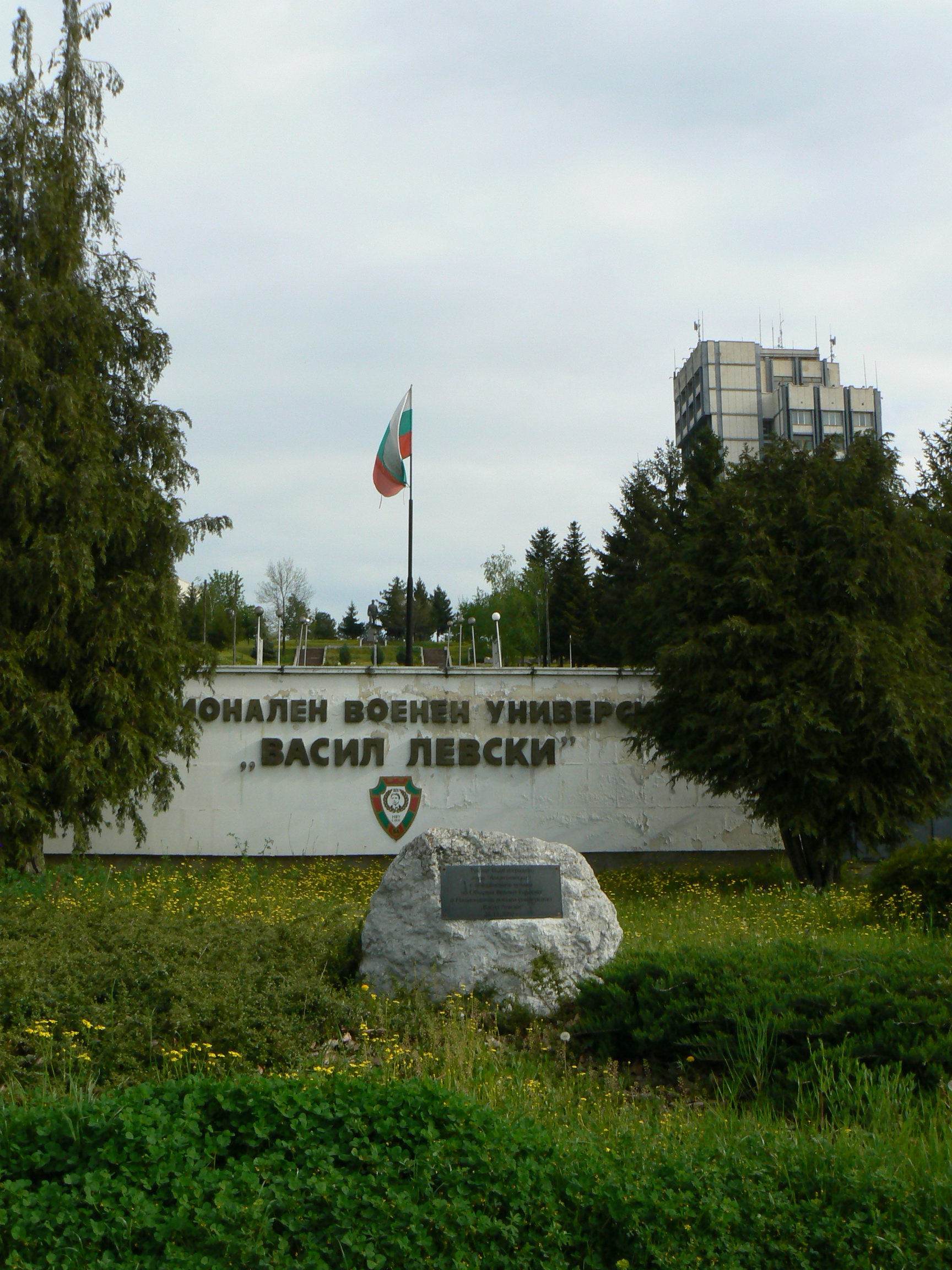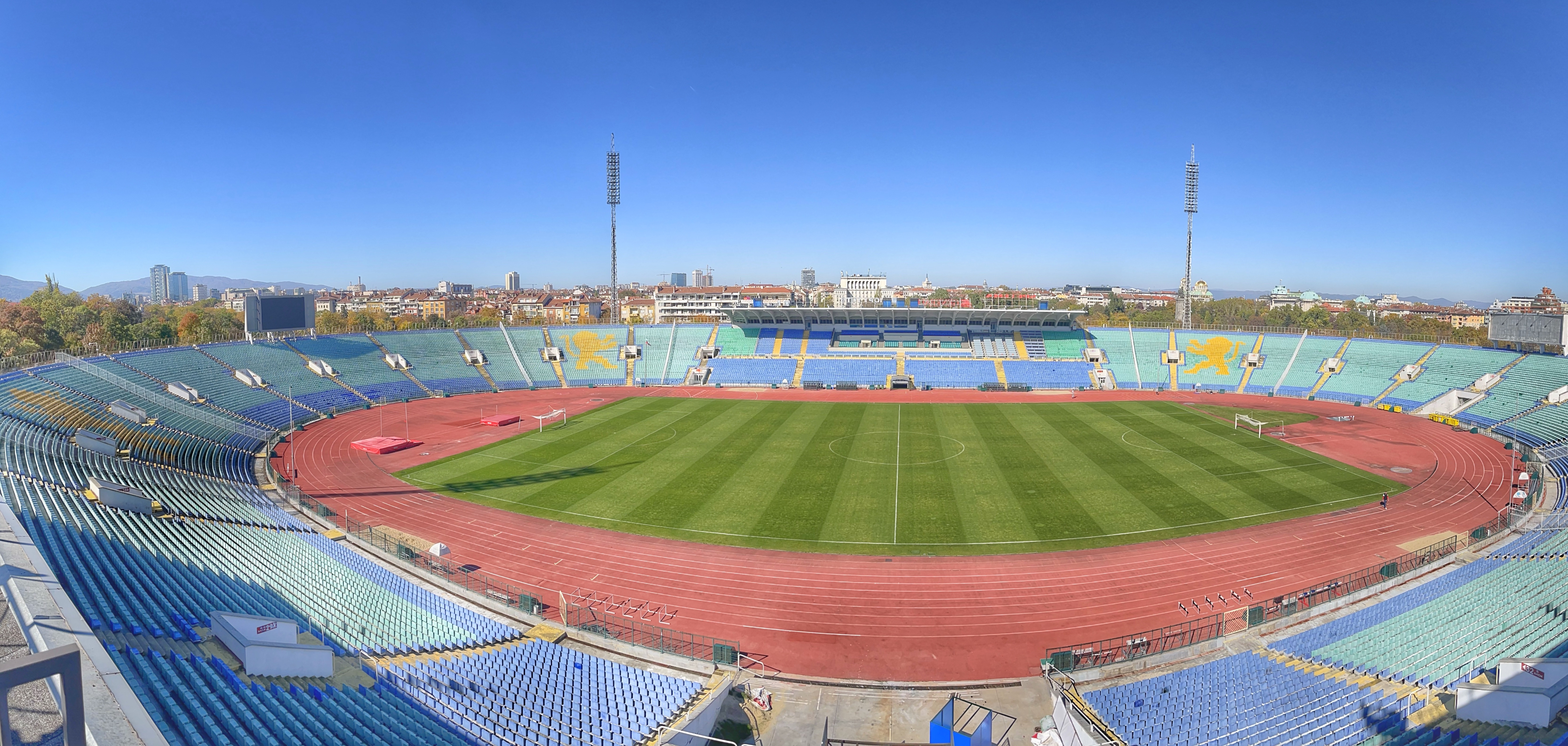|
Vasil Levski (other)
Vasil Levski (1840–1873) is the national hero of Bulgaria, several places were named after him Places in Sofia, Bulgaria *Monument to Vasil Levski, Sofia in the centre of Sofia, the capital of Bulgaria *Vasil Levski Boulevard, major boulevard in the capital of Bulgaria, Sofia *Vasil Levski National Military University, Bulgaria's national military academy *Vasil Levski National Stadium, one of Bulgaria's largest sports venues and the country's second largest stadium *Vasil Levski Stadium Metro Station, station on the Sofia Metro in Bulgaria Villages in Bulgaria *, a village in Alfatar Municipality, Bulgaria *, a village in Targovishte Municipality, Bulgaria *, a village in Opan Municipality, Bulgaria *, a village in the municipality of Karlovo Karlovo ( ) is a historically important town in central Bulgaria located in a fertile valley along the river Stryama at the southern foot of the Balkan Mountains. It is administratively part of Plovdiv Province and has a populatio ... [...More Info...] [...Related Items...] OR: [Wikipedia] [Google] [Baidu] |
Vasil Levski
Vasil Levski (, spelled in Reforms of Bulgarian orthography, old Bulgarian orthography as , ), born Vasil Ivanov Kunchev (; 18 July 1837 – 18 February 1873), was a Bulgarians, Bulgarian revolutionary who is, today, a Folk hero, national hero of Bulgaria. Dubbed the ''Apostle of Freedom'', Levski ideologised and strategised a revolutionary movement to Liberation of Bulgaria, liberate Bulgaria from Ottoman Empire, Ottoman rule. Levski founded the Internal Revolutionary Organisation, and sought to foment a nationwide uprising through a network of secret regional committees. Born in the Sub-Balkan valleys, Sub-Balkan town of Karlovo to middle-class parents, Levski became an Orthodox monk before emigrating to join the two Bulgarian Legions in Principality of Serbia, Serbia and other Bulgarian revolutionary groups. Abroad, he acquired the nickname ''Levski'' ("Lionlike"). After working as a teacher in Bulgarian lands, he propagated his views and developed the concept of his Bu ... [...More Info...] [...Related Items...] OR: [Wikipedia] [Google] [Baidu] |
Monument To Vasil Levski, Sofia
The Monument to Vasil Levski (, ''Pametnik na Vasil Levski'') in the centre of Sofia, the capital of Bulgaria, is one of the first monuments to be built in the then newly liberated Principality of Bulgaria. It commemorates the hanging of Bulgarian national hero and major revolutionary figure Vasil Levski on the same spot on 18 February 1873. The monument is 13 m high, made of grey Balkan granite and designed by Czech architect Antonín Kolář. The bronze bas-relief of the head of Levski, part of the monument, was created by Josef Strachovský (or, according to other sources, Austrian sculptor Rudolf Weyr), whereas Italian Abramo Peruchelli did the stonecutting work. It was inaugurated on 22 October 1895, but was planned and worked on ever since the Liberation of Bulgaria in 1878, the construction being hindered by a chronic lack of funds and negligence, and taking a whole 17 years. This ignited a wave of indignation among the Bulgarian intellectuals of the time, with the p ... [...More Info...] [...Related Items...] OR: [Wikipedia] [Google] [Baidu] |
Vasil Levski Boulevard
Vasil Levski Boulevard () is a major boulevard in Sofia, the capital of Bulgaria. It lies between the Freight Station Square at the Slivnitsa and Danail Nikolaev Boulevards and the area of the National Palace of Culture. It is named after Bulgaria's national hero Vasil Levski. Some of the most prominent landmarks of the capital are situated along the boulevard, including the National Academy of Arts, SS. Cyril and Methodius National Library, Sofia University, the State Agency of Youth and Sports, Battenberg Mausoleum, the Monument to Vasil Levski and others. Vasil Levski Boulevard crosses many of the city's vital transport arteries, such as Georgi Rakovski Street, Tsar Osvoboditel Boulevard at Sofia University, Patriarch Evtimiy Boulevard and Graf Ignatiev Street at Patriarch Evtimiy Square. The boulevard is served by many public bus and trolley bus lines and also SU St. Kliment Ohridski Metro Station. Gallery Image:Levski monument.jpg, Monument to Vasil Levski Ima ... [...More Info...] [...Related Items...] OR: [Wikipedia] [Google] [Baidu] |
Vasil Levski National Military University
The Vasil Levski National Military University () is Bulgaria's national military academy. History Founded in 1878 as a military school in Plovdiv, it was moved to Sofia the same year. On 19 April 1924, it was promoted to university status; in 1945 it was named in honour of Bulgarian national hero Vasil Levski (1837–1873). Since 1958, it has been headquartered in Veliko Tarnovo. On 14 June 2002, the structure of Bulgarian military academies was reorganized: the Veliko Tarnovo-based Vasil Levski National Military University also covers the artillery academy (now a faculty) in Shumen. (The Georgi Rakovski Military Academy, which functions as a staff college, remains independent while the former air force An air force in the broadest sense is the national military branch that primarily conducts aerial warfare. More specifically, it is the branch of a nation's armed services that is responsible for aerial warfare as distinct from an army aviati ... faculty in Dolna Mit ... [...More Info...] [...Related Items...] OR: [Wikipedia] [Google] [Baidu] |
Vasil Levski National Stadium
Vasil Levski National Stadium (), named after Bulgarian Folk hero, national hero and revolutionary Vasil Levski (1837–1873), is the country's second largest stadium. The stadium has 43,230 seats and is located in the centre of Sofia, on the territory of the city's oldest and most famous park - the Borisova gradina. The Bulgaria national football team's home matches and the Bulgarian Cup finals are held at the venue, as well as sport of athletics, athletics competitions. It was used as the home venue for Levski Sofia's Champions League games, and is often used for Eternal derby of Bulgarian football, important derbies between the big clubs from Sofia, instead of their own home stadiums. History Vasil Levski National Stadium was officially opened in 1953, extended in 1966 and renovated in 2002. Prior to their demolition by the Communist authorities during the 1940s and 50s, two other stadiums stood on the ground where the current national stadium lies. One of those was Levski S ... [...More Info...] [...Related Items...] OR: [Wikipedia] [Google] [Baidu] |
Vasil Levski Stadium Metro Station
Vasil Levski Stadium Metro Station () is a station on the Sofia Metro in Bulgaria Bulgaria, officially the Republic of Bulgaria, is a country in Southeast Europe. It is situated on the eastern portion of the Balkans directly south of the Danube river and west of the Black Sea. Bulgaria is bordered by Greece and Turkey t .... It was introduced into service on 8 May 2009. It serves the Vasil Levski National Stadium and New CSKA Sofia Stadium. The architectural layout was created by architects Kr. Andreev and D. Mushev. Automatic Platform Screen Door (APSD) In August 2020, testing of the first automatic Platform screen doors (Rope-type Screen Door) commenced at the Vasil Levski Stadium Metro Station of the Sofia Metro. These safety barriers are intended for greater safety of passengers. Automatic partition doors on the existing Line 1, in addition to the Vasil Levski Stadium Metro Station, are also being built at the Opalchenska Metro Station. By 2022, this RSD syst ... [...More Info...] [...Related Items...] OR: [Wikipedia] [Google] [Baidu] |
Alfatar Municipality
Alfatar Municipality () is a small municipality ('' obshtina'') in Silistra Province, Northeastern Bulgaria, located in the Danubian Plain, in the area of the South Dobrudzha geographical region, about 15 km south of Danube river. It is named after its administrative centre - the town of Alfatar. The municipality embraces a territory of Characterization of Silistra Province with a population of 3,324 inhabitants, as of December 2009.Bulgarian National Statistical Institute - Bulgarian provinces and municipalities in 2009 The main road "7" cro ... [...More Info...] [...Related Items...] OR: [Wikipedia] [Google] [Baidu] |
Targovishte Municipality
Targovishte Municipality () is a municipality ('' obshtina'') in Targovishte Province, Northeastern Bulgaria, located in the transition between the Danubian Plain and the area of the so-called Fore-Balkan. It is named after its administrative centre - the city of Targovishte which is also the capital of the province. The municipality embraces a territory of with a population of 60,497 inhabitants, as of December 2009. The Hemus motorway is planned to cross the area north of the main city. Settlements (towns are shown in bold): Population (December 2009) * Targovishte - Търговище - 37,375 * Alvanovo - Алваново - 182 * Aleksandrovo - Александрово - 252 * Bayachevo - Баячево - 860 * Bistra - Бистра - 202 * Bozhurka - Божурка - 301 * Bratovo - Братово - 207 * Buynovo - Буйново - 665 * Buhovtsi - Буховци - 640 * Cherkovna - Черковна - 671 * Davidovo - Давидово - 461 * Drag ... [...More Info...] [...Related Items...] OR: [Wikipedia] [Google] [Baidu] |
Opan Municipality
Opan Municipality is located in Bulgaria. The administrative centre is in Opan. It has an area of 257.5 square kilometres, has 3 358 inhabitants and includes the following 13 places: * Bashtino * Byal Izvor * Byalo Pole * Knyazhevsko * Kravino * Opan * Pastren * Sredets * Stoletovo * Trakiya * Vasil Levski Vasil Levski (, spelled in Reforms of Bulgarian orthography, old Bulgarian orthography as , ), born Vasil Ivanov Kunchev (; 18 July 1837 – 18 February 1873), was a Bulgarians, Bulgarian revolutionary who is, today, a Folk hero, national ... * Venets * Yastrebovo Demography Religion According to the latest Bulgarian census of 2011, the religious composition, among those who answered the optional question on religious identification, was the following: References External links Opan municipality page at the Stara Zagora Province website Geography of Stara Zagora Province {{StaraZagora-geo-stub ... [...More Info...] [...Related Items...] OR: [Wikipedia] [Google] [Baidu] |
Karlovo
Karlovo ( ) is a historically important town in central Bulgaria located in a fertile valley along the river Stryama at the southern foot of the Balkan Mountains. It is administratively part of Plovdiv Province and has a population of about 19,373 (), the mayor being Dr. Emil Kabaivanov.Karlovo is famous for the worldwide-known rose oil, which is grown there and used in producing perfume. In addition to this, Karlovo is the birthplace of Vasil Levski, the most distinguished Bulgarian to start preparing the national liberation from the Ottoman rule in the late 19th century. There is a museum and large monument dedicated to him. Karlovo is also a popular location for tourism in the region. During the 2000s, Bulgarian archaeologists made discoveries in Central Bulgaria which were summarized as 'The Valley of the Thracian Kings'. On 19 August 2005, some archaeologists announced they had found the first Thracian capital, which was situated near Karlovo in Bulgaria. Many polished c ... [...More Info...] [...Related Items...] OR: [Wikipedia] [Google] [Baidu] |



